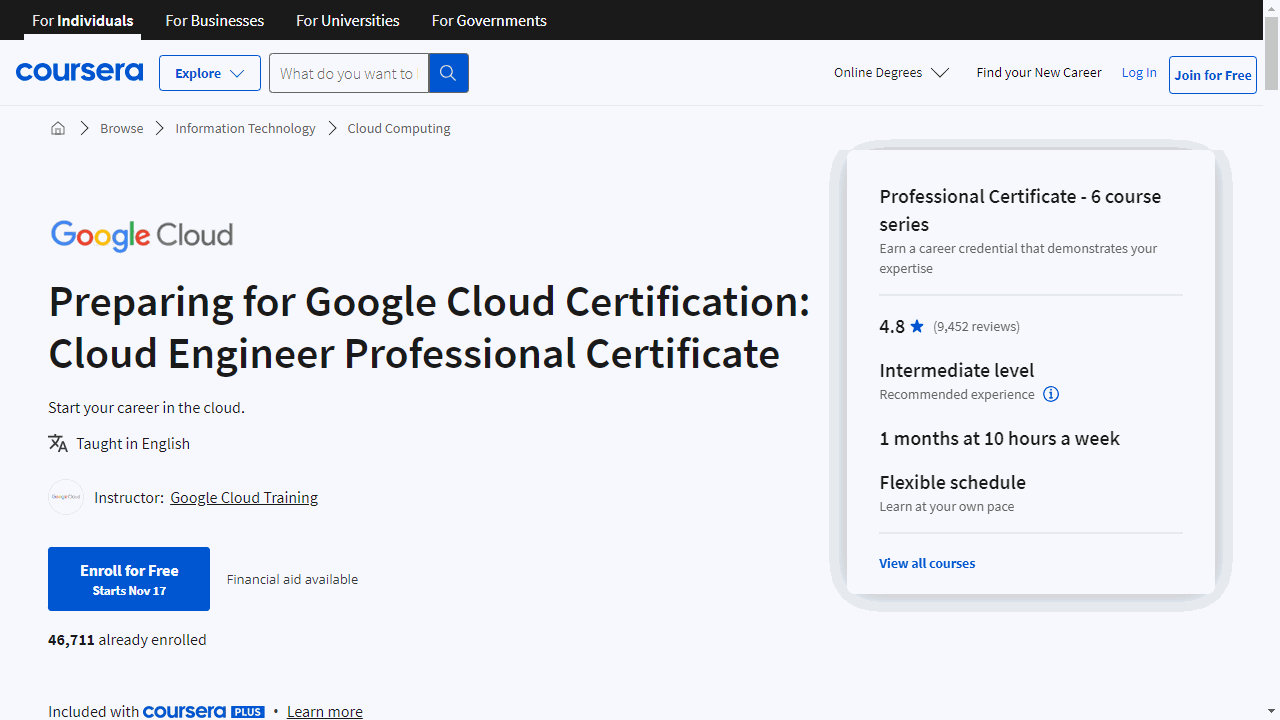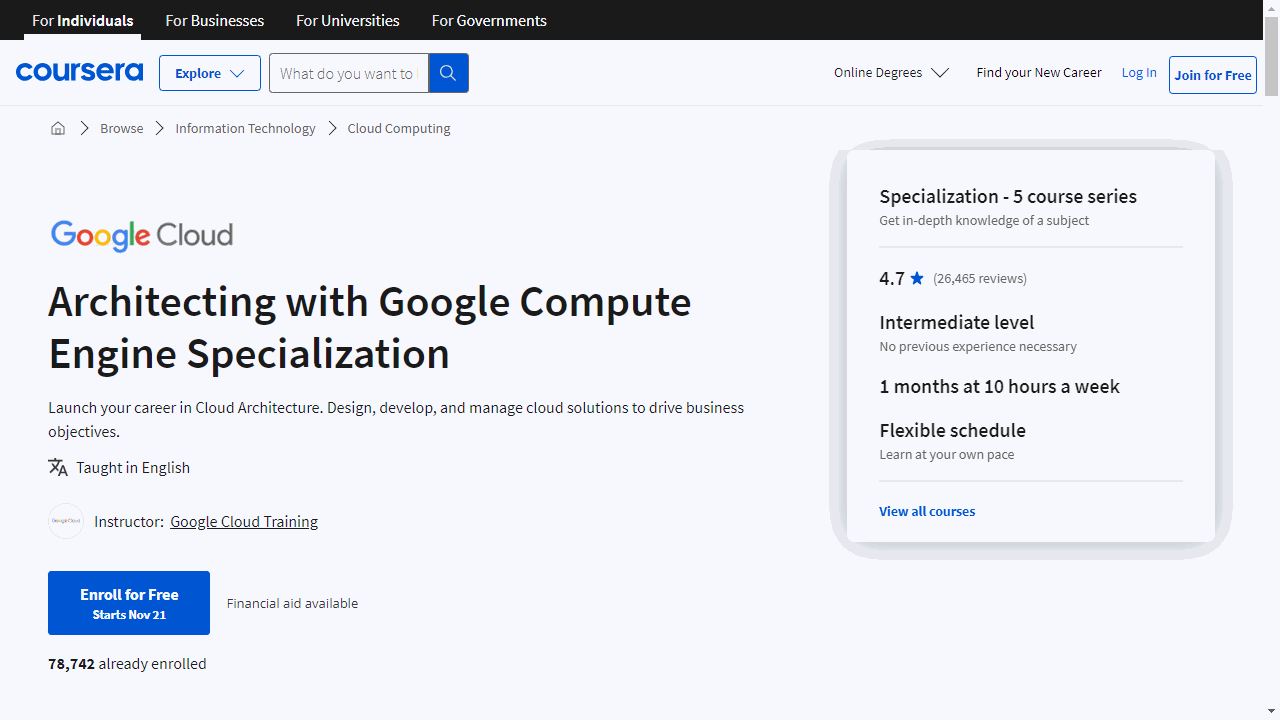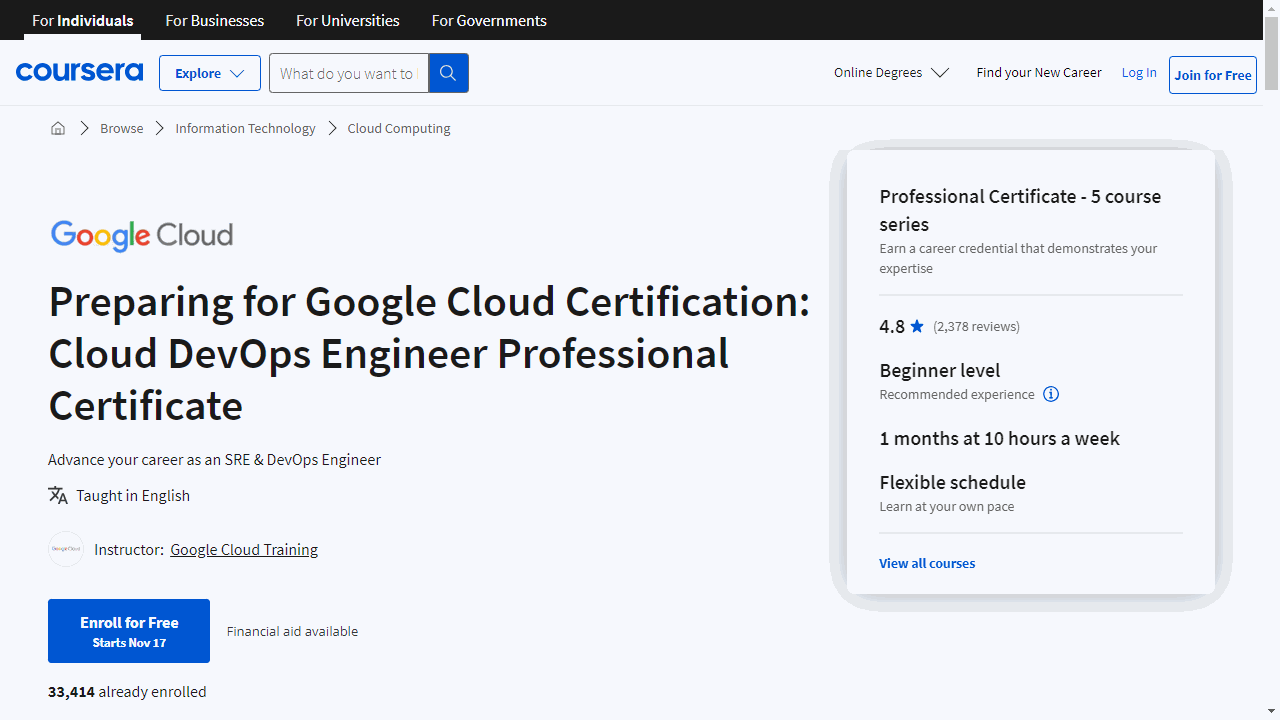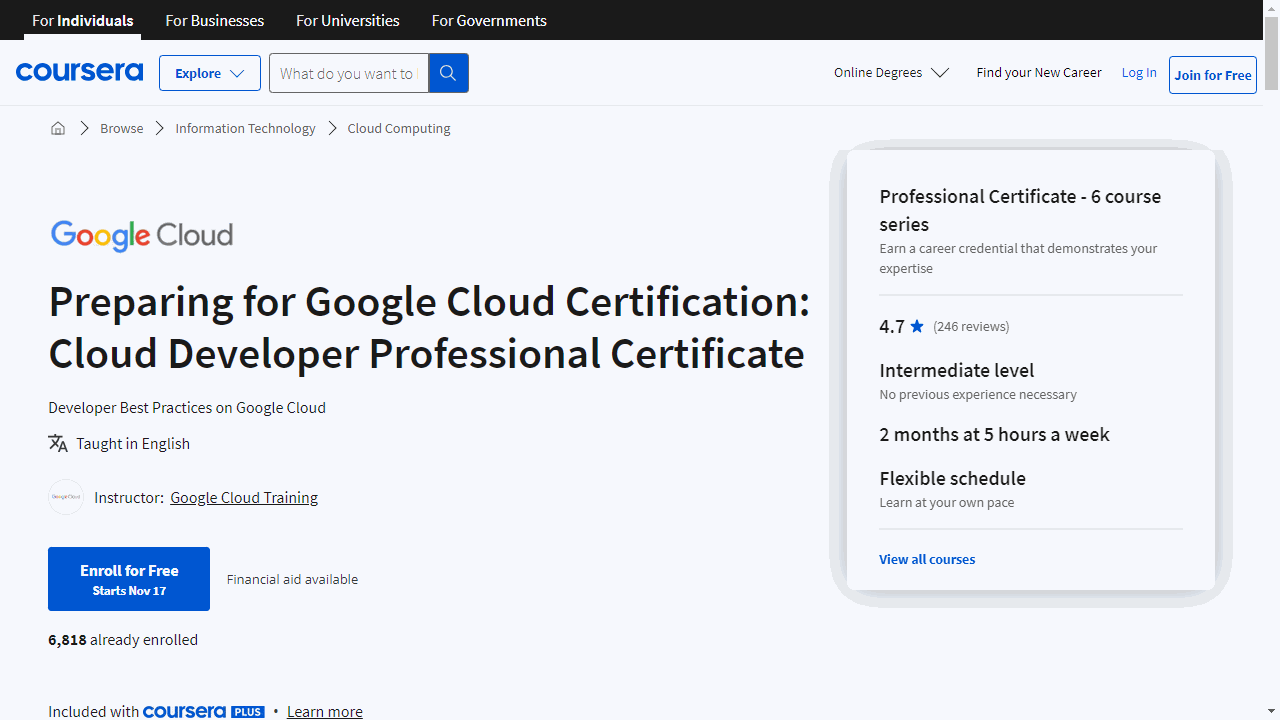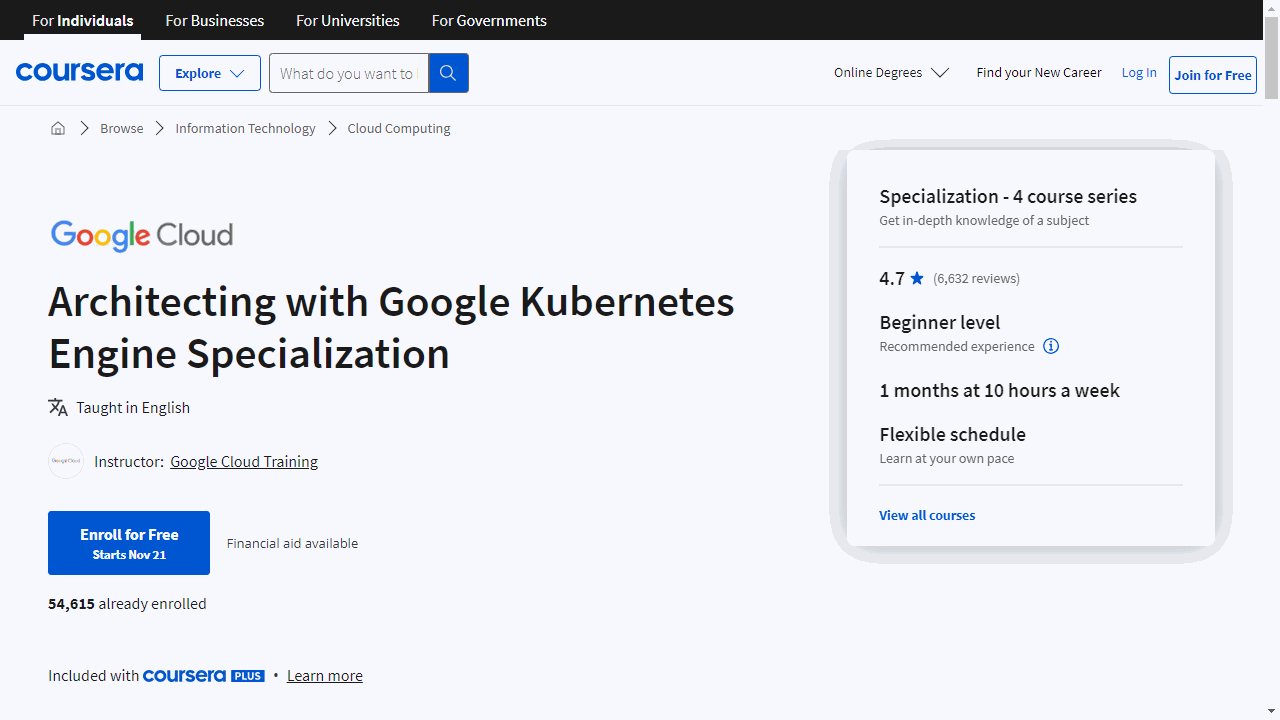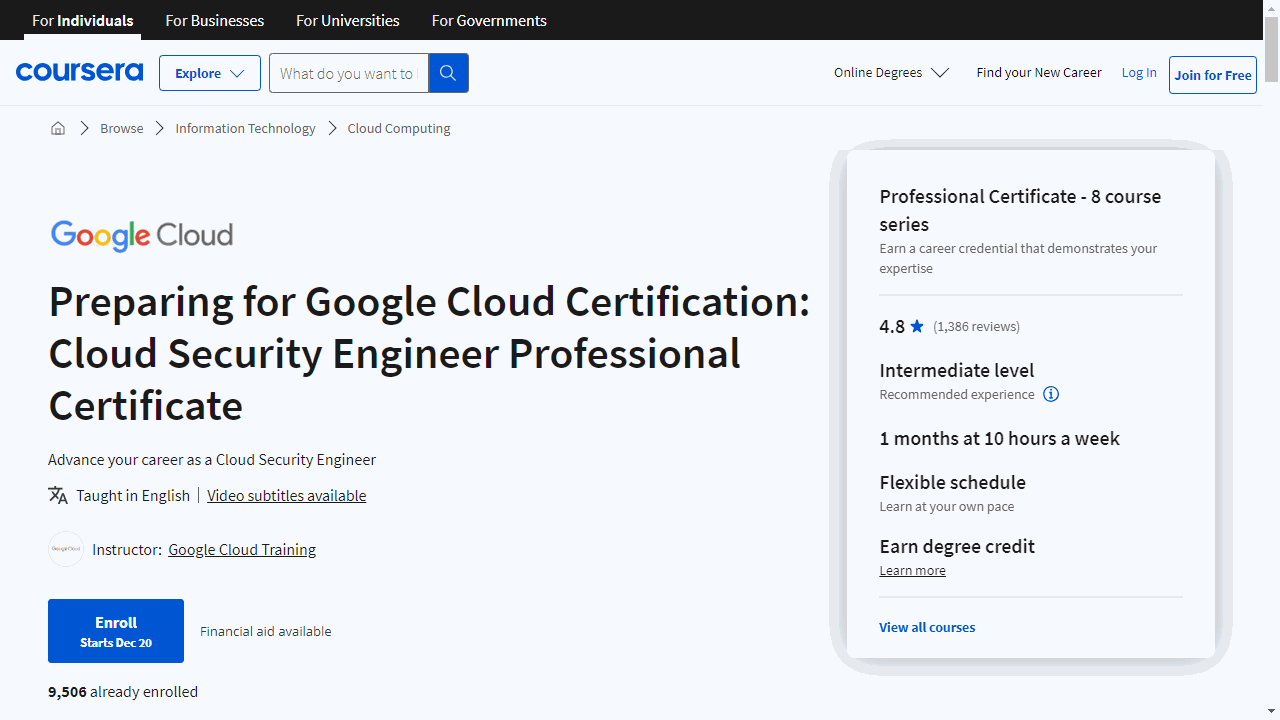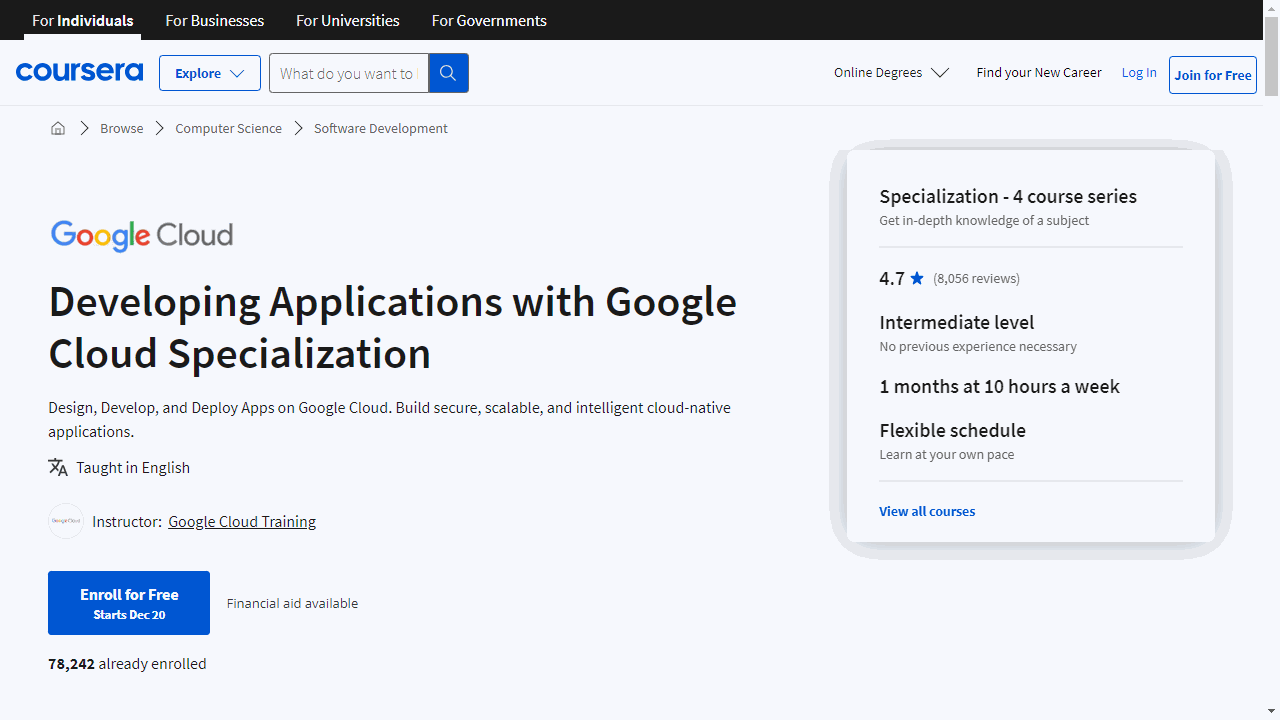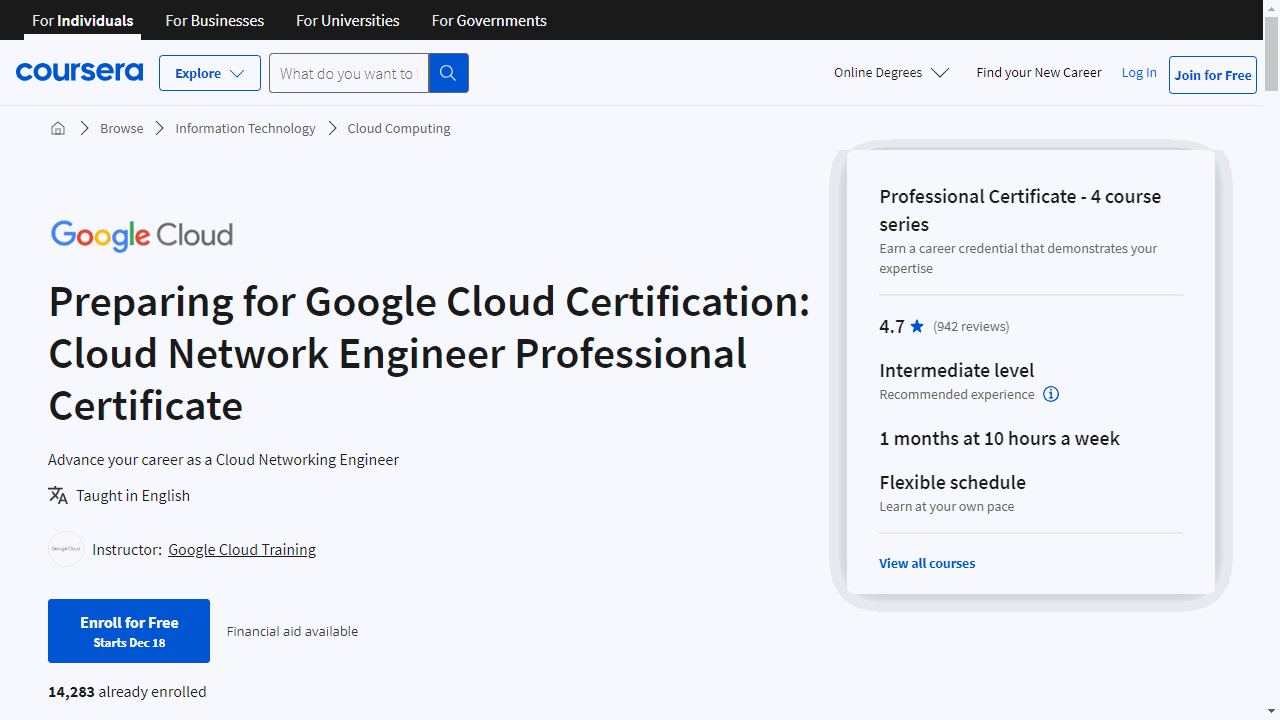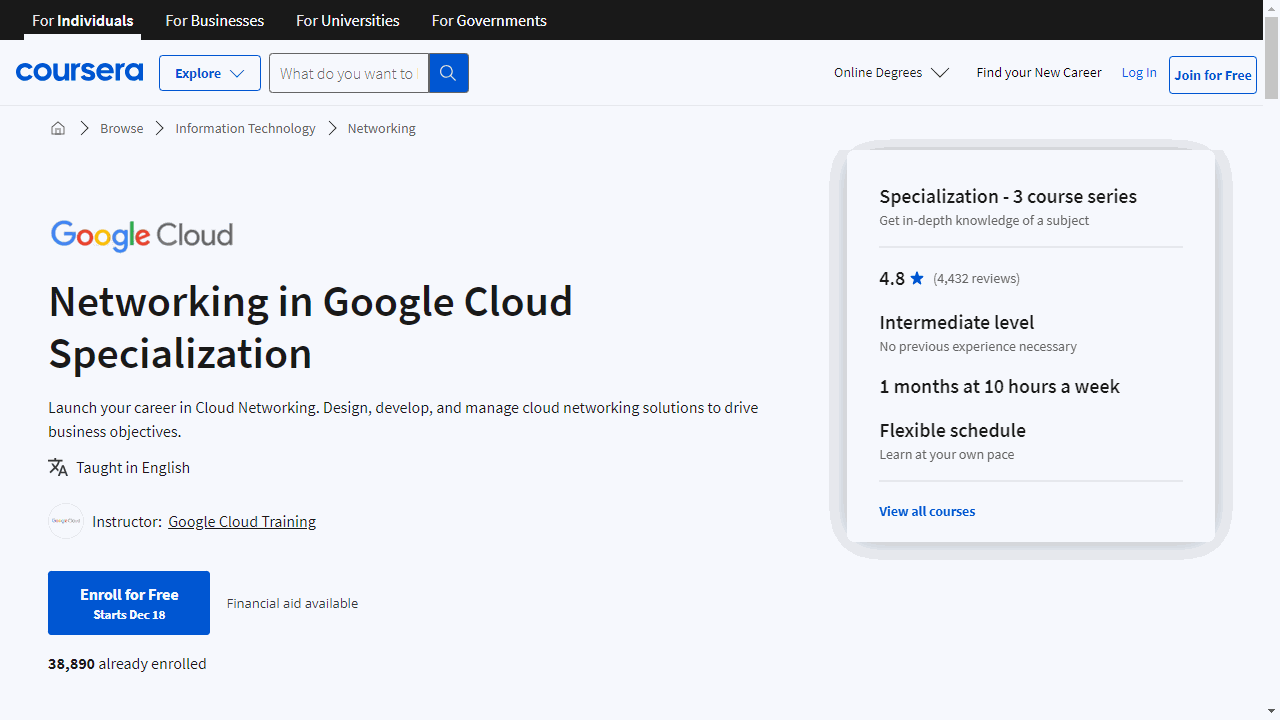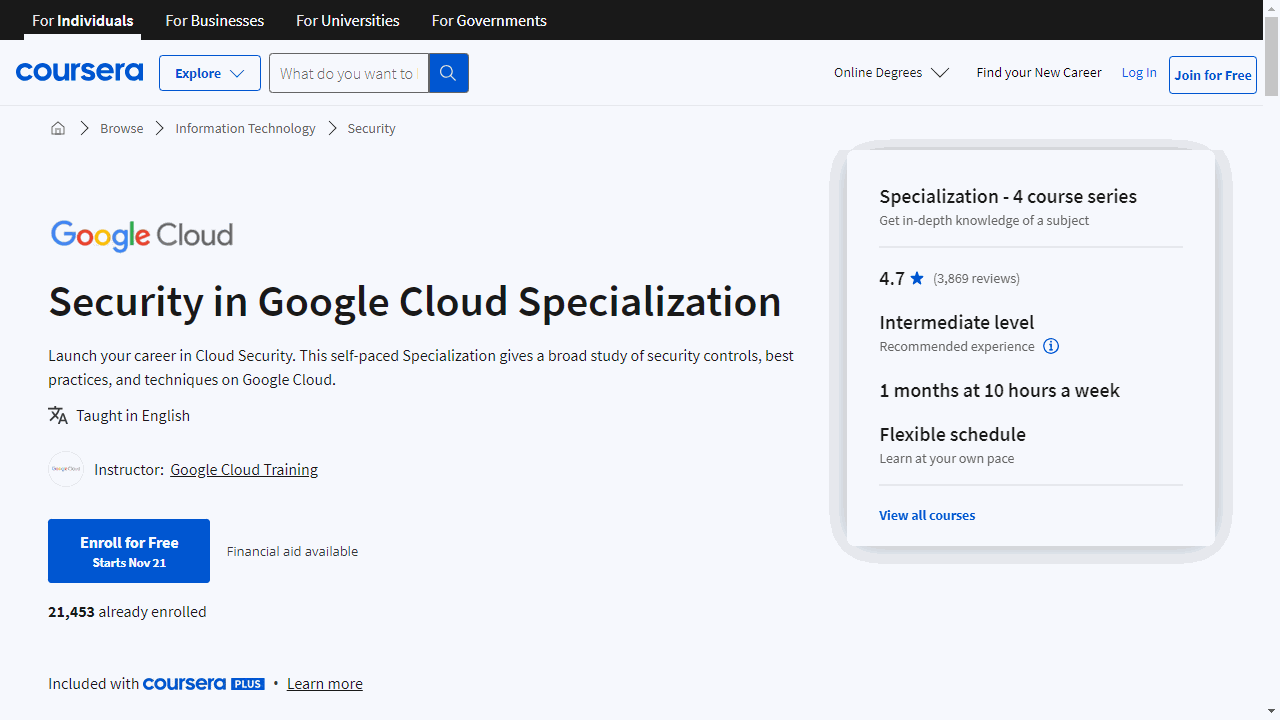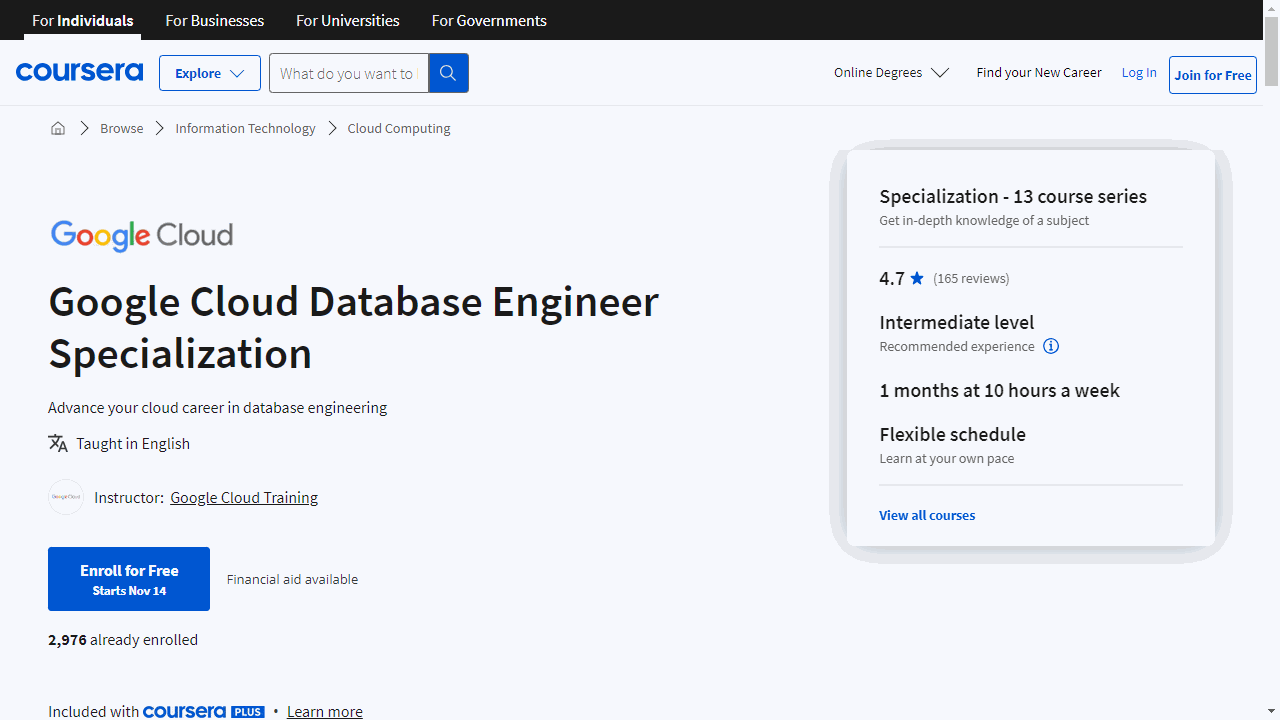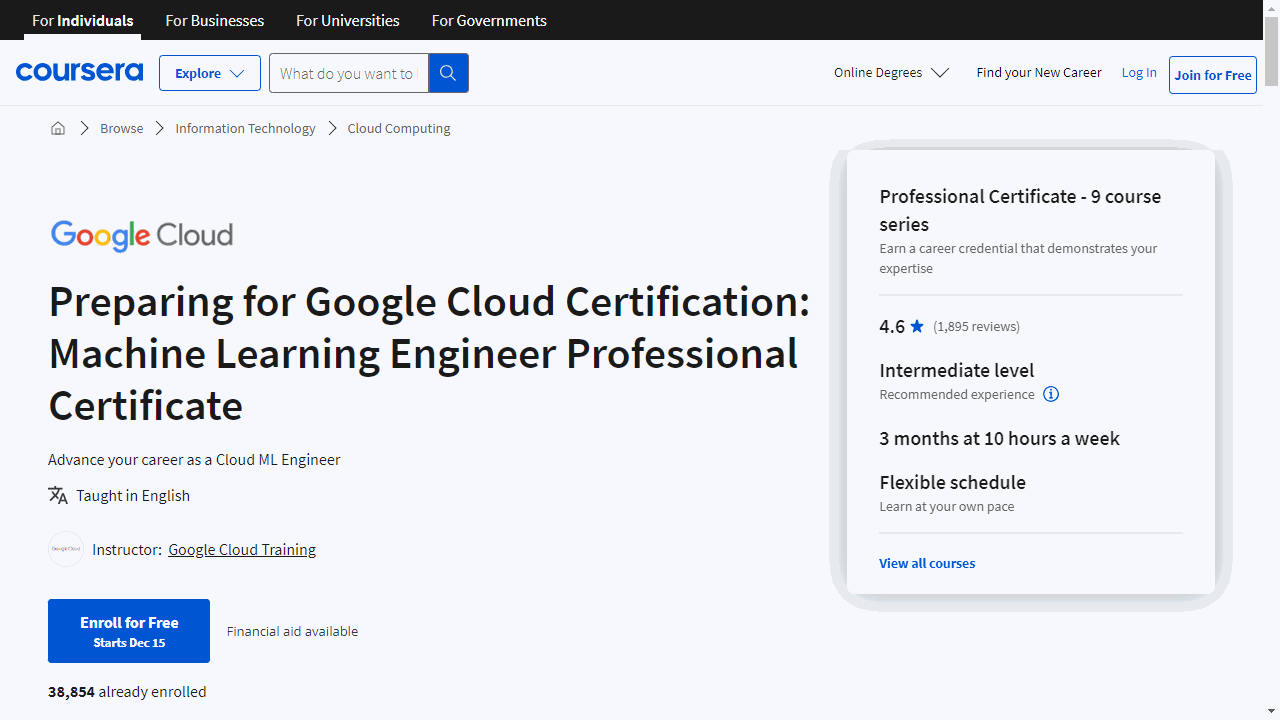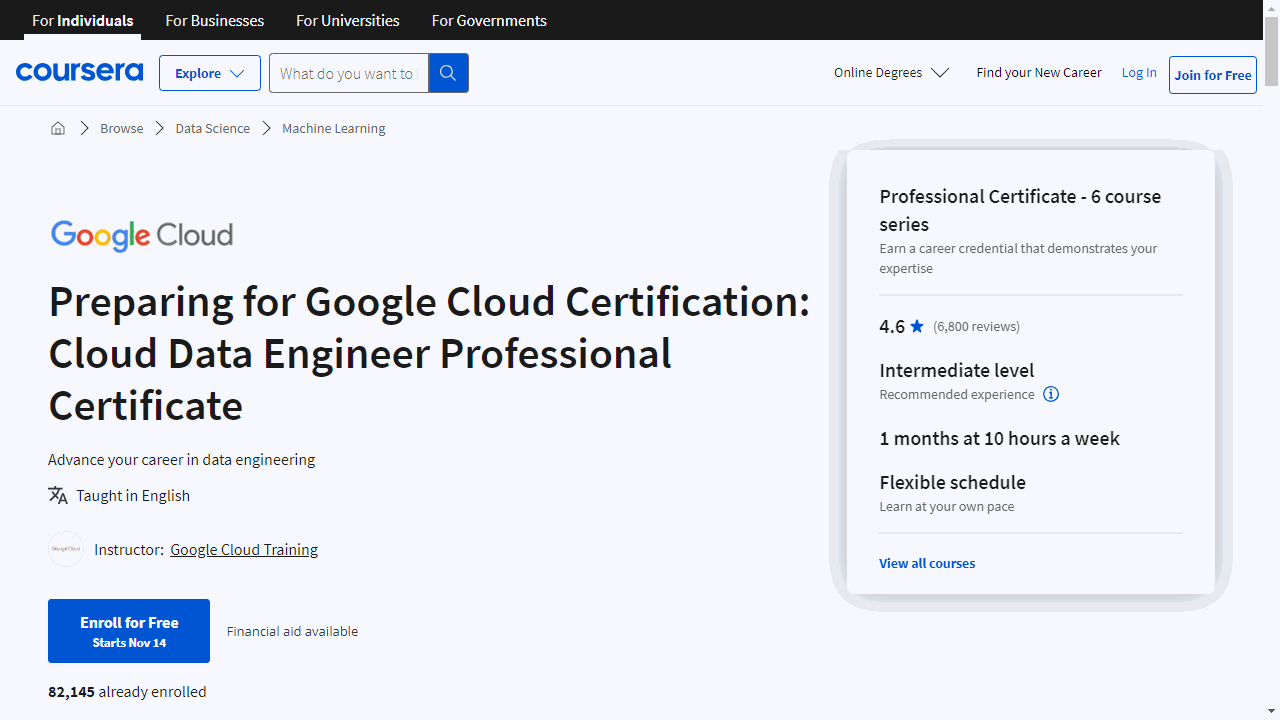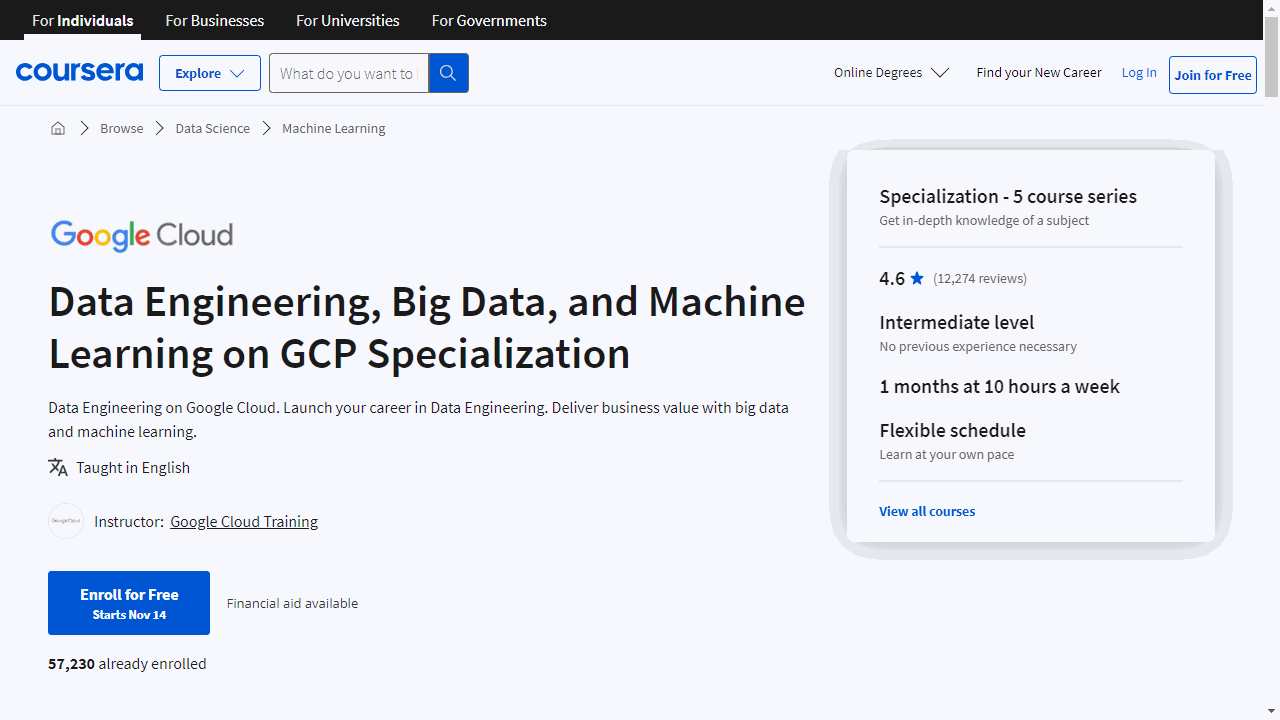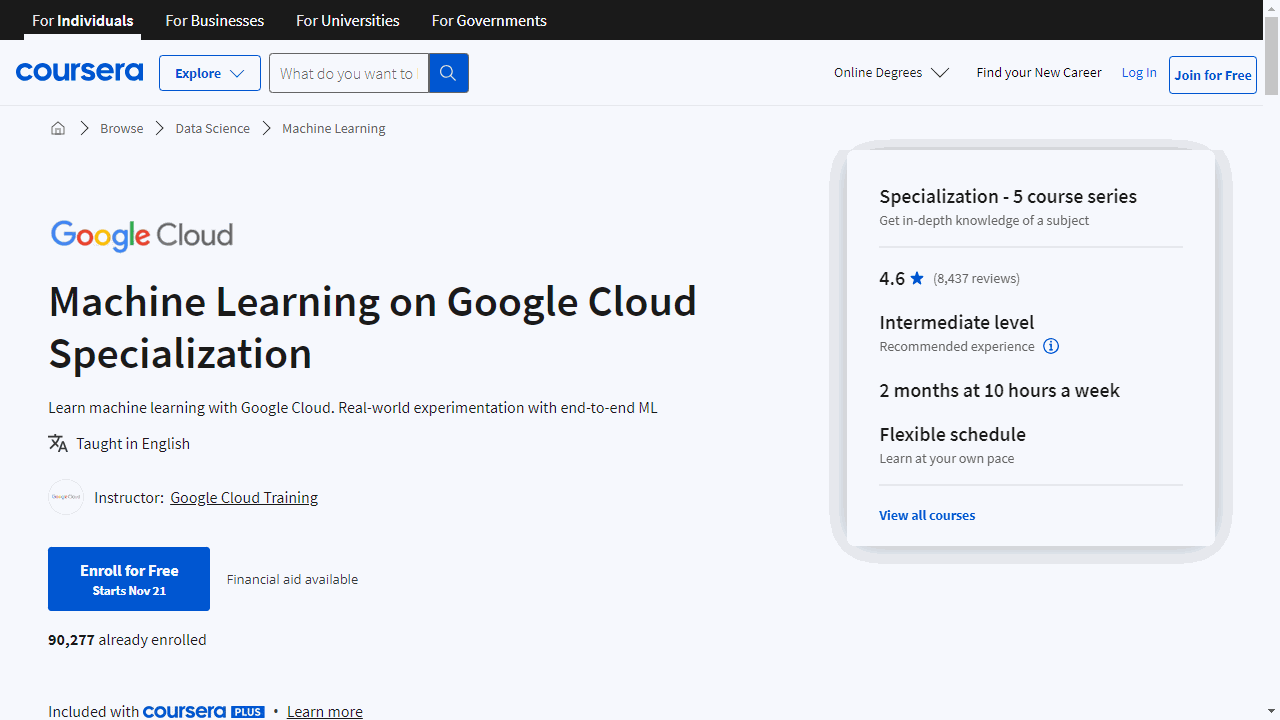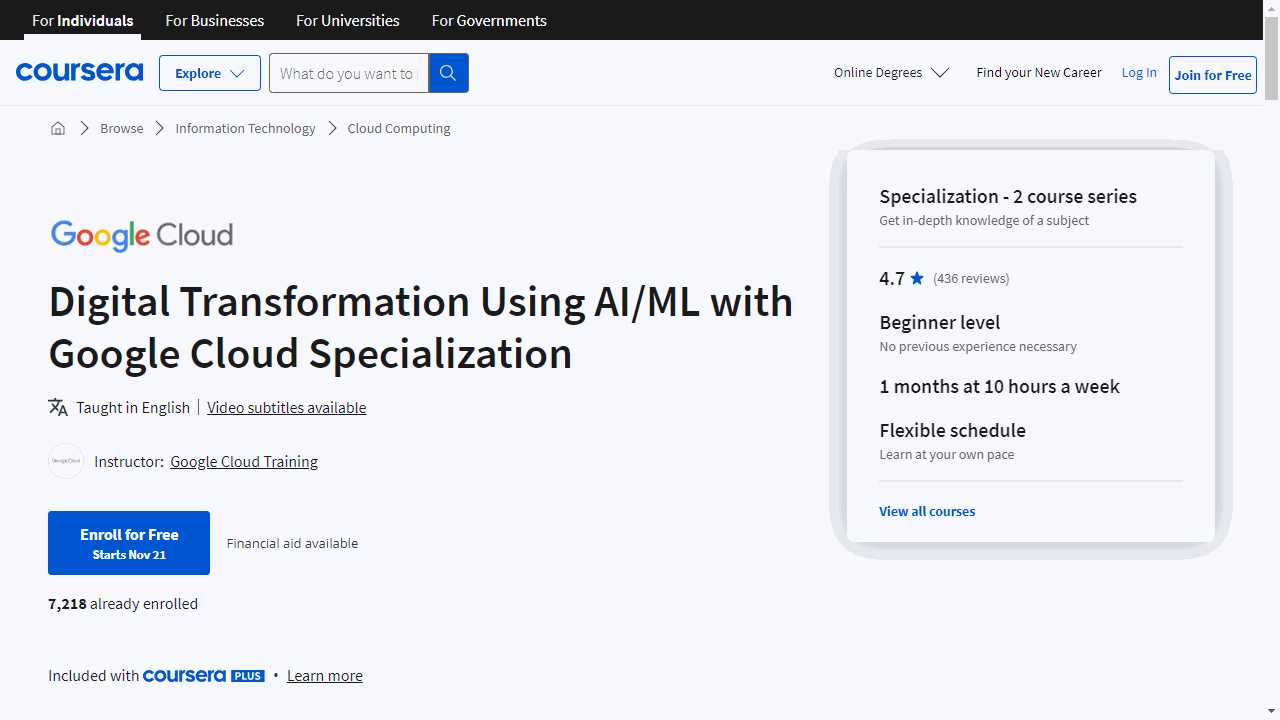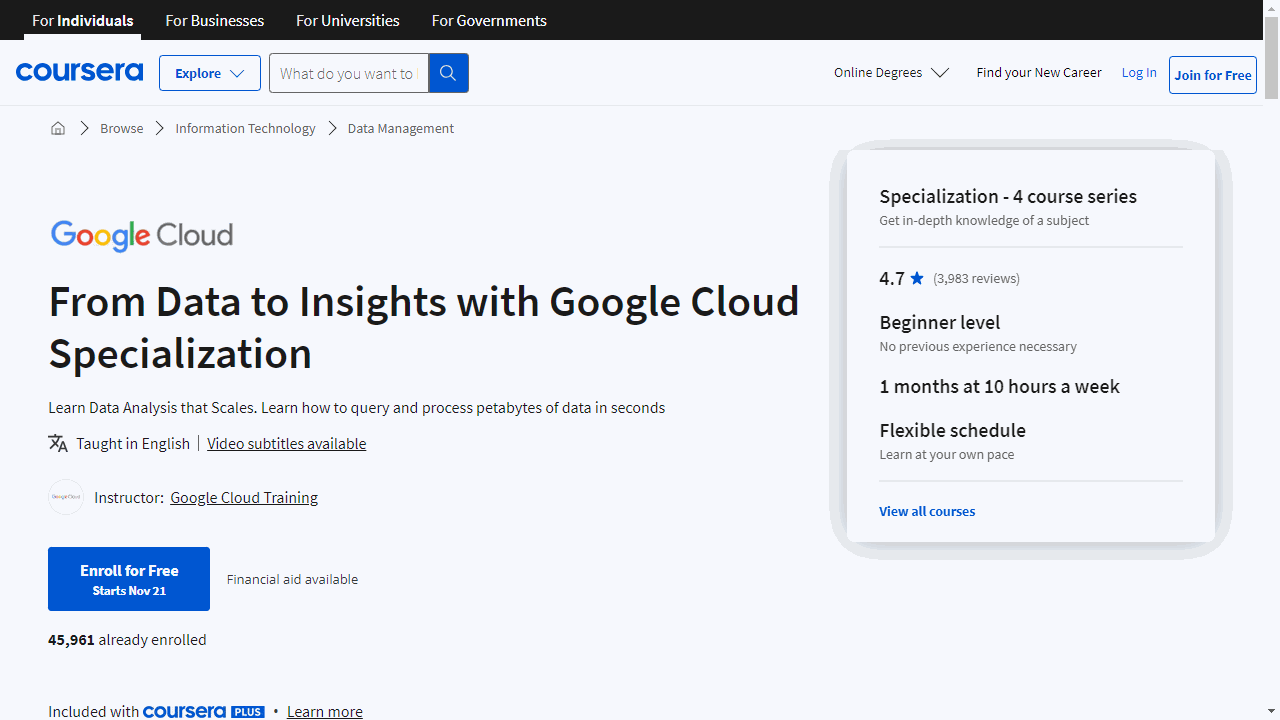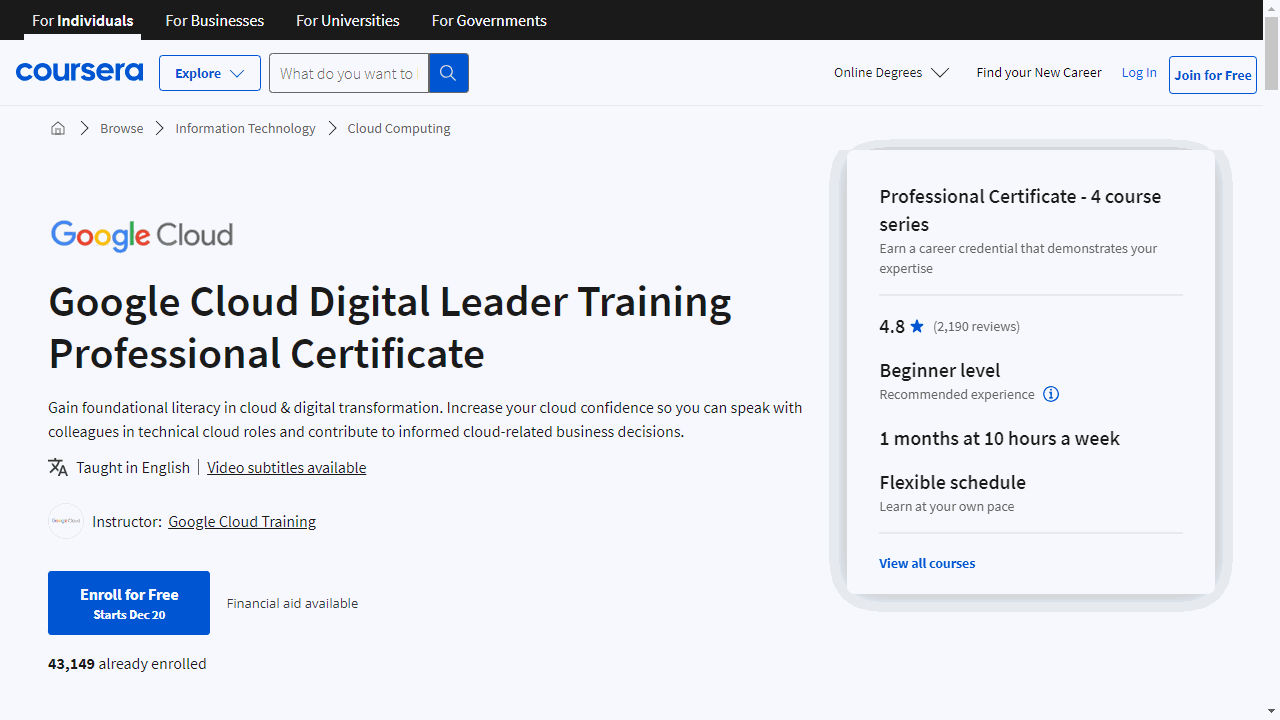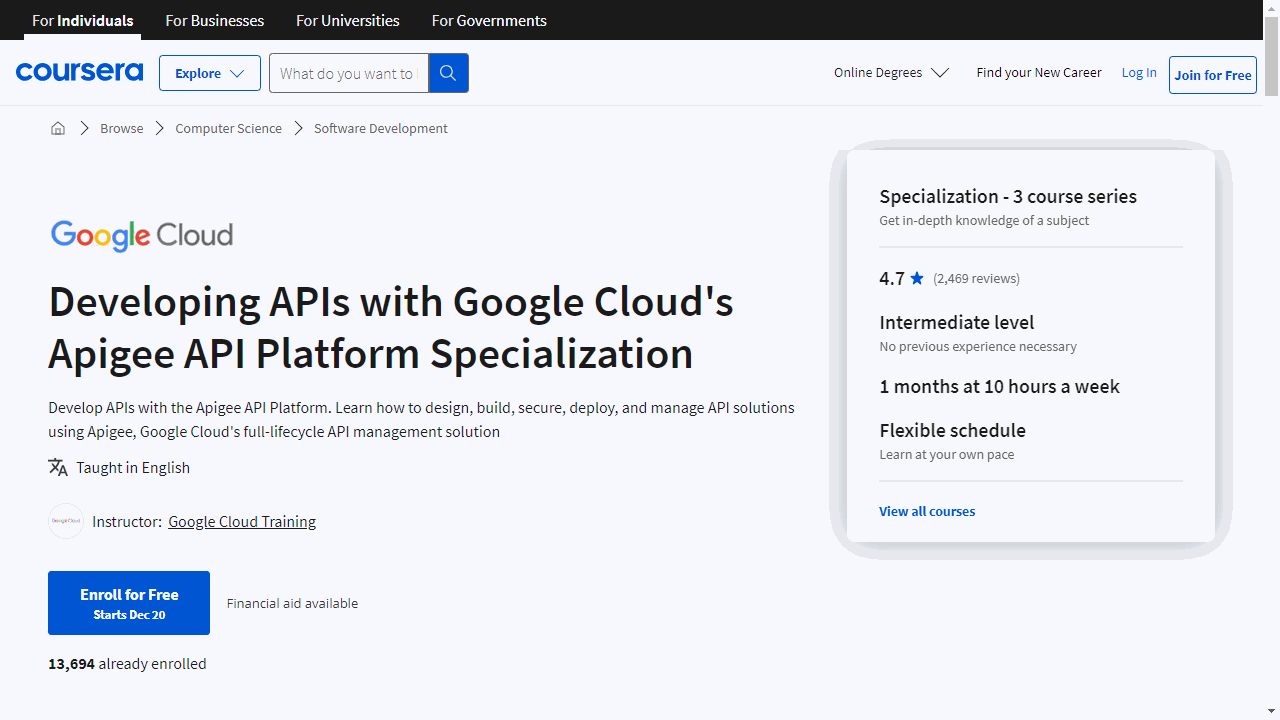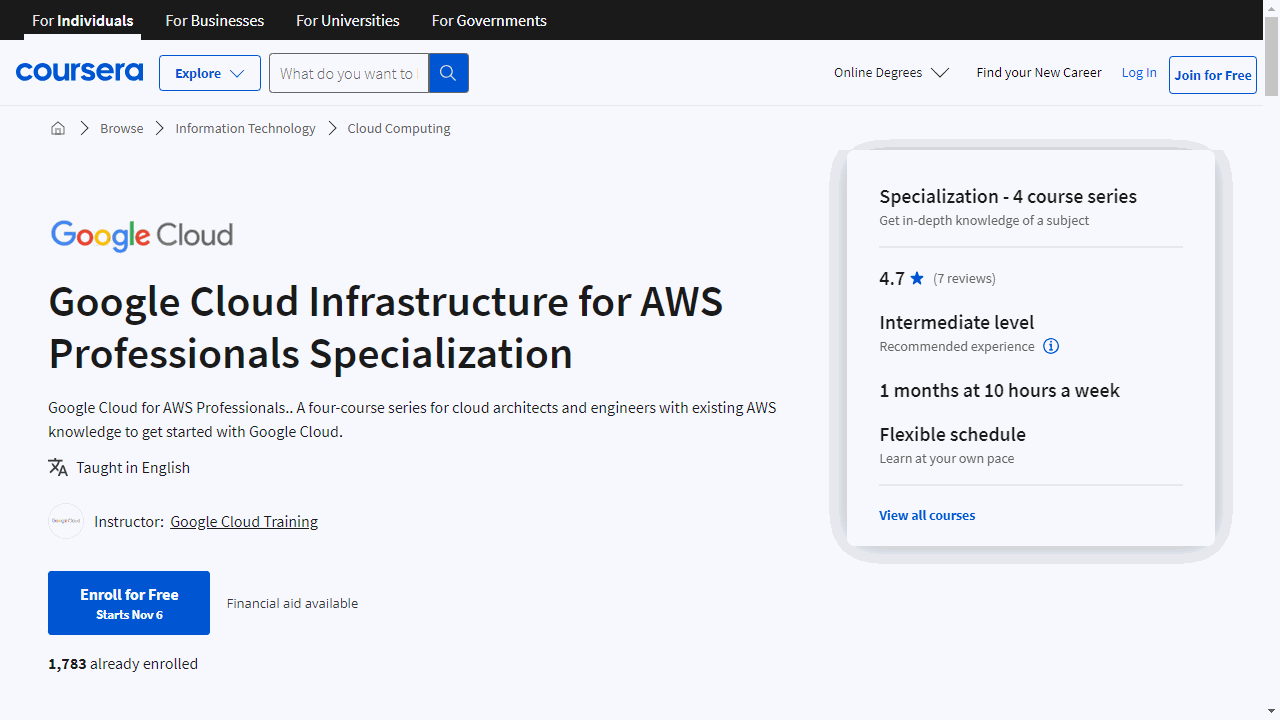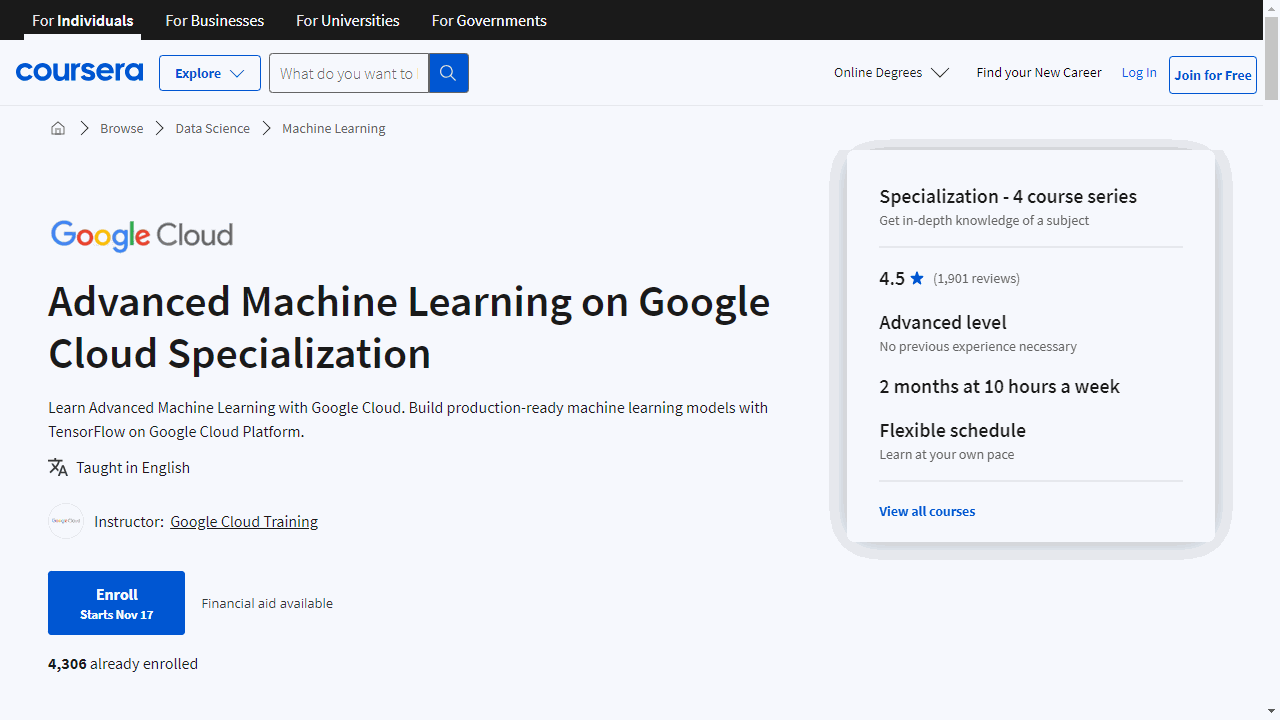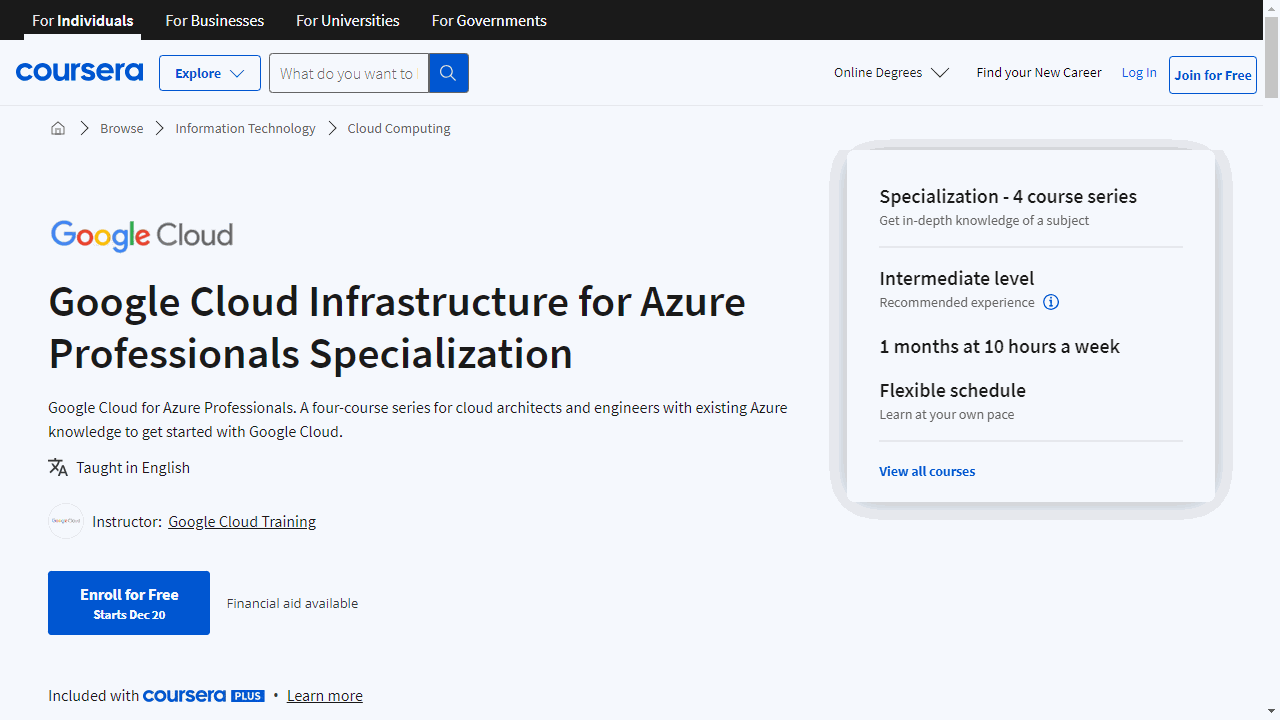Google Cloud Platform (GCP) is a suite of cloud computing services that offers a vast array of tools and resources for businesses and developers.
It provides scalable infrastructure, powerful data analytics capabilities, and a wide range of AI and machine learning solutions.
Learning GCP can empower you to build and deploy applications, manage data effectively, and harness the power of the cloud to drive innovation and efficiency.
Finding the right Google Cloud course can feel overwhelming, especially given the vast selection available on platforms like Coursera.
You’re looking for a program that’s comprehensive, practical, and taught by experts, but also fits your learning style and career aspirations.
We’ve carefully reviewed countless options and recommend the Google Cloud Engineer Professional Certificate as the best overall course on Coursera.
This program is a robust set of courses designed to equip you with the essential skills and knowledge to excel as a Google Cloud Engineer.
It includes hands-on labs, practical exercises, and a clear focus on the real-world applications of GCP.
While this is our top choice, other great options exist on Coursera, tailored to specific areas of Google Cloud, including data engineering, machine learning, security, and networking.
Keep reading to discover these options and find the perfect Google Cloud course for your unique learning journey.
Google Cloud Engineer Professional Certificate
Provider: Google Cloud
This suite of courses is designed to equip you with the skills and knowledge needed to excel in the cloud domain, particularly if you’re eyeing a Google Cloud career.
Starting with “Google Cloud Fundamentals: Core Infrastructure,” you’ll lay the groundwork for your cloud education.
This course demystifies the core concepts and terminology of Google Cloud, setting you up to understand its diverse computing and storage services.
You’ll learn how to navigate the infrastructure and control resources effectively, a fundamental skill for any cloud professional.
Progressing to “Essential Google Cloud Infrastructure: Foundation,” you’ll delve into the practical aspects of cloud infrastructure, including setting up networks and virtual machines.
The course emphasizes hands-on learning, allowing you to interact with the Google Cloud console and Cloud Shell, which are crucial tools for any cloud engineer.
Building on that foundation, “Essential Google Cloud Infrastructure: Core Services” introduces you to advanced infrastructure components.
You’ll tackle identity and access management, data storage services, and resource monitoring—key areas that ensure the security and efficiency of cloud operations.
As your skills develop, “Elastic Google Cloud Infrastructure: Scaling and Automation” teaches you how to scale and automate your cloud infrastructure.
Understanding how to connect infrastructure and configure load balancers and autoscaling is vital for managing large-scale, resilient systems.
The course “Architecting with Google Kubernetes Engine: Foundations” is where you’ll get acquainted with containerization and Kubernetes, technologies that are revolutionizing the way applications are deployed and managed.
This knowledge is not just trendy; it’s becoming essential for modern cloud engineers.
Lastly, “Preparing for Your Associate Cloud Engineer Journey” is the capstone that helps you consolidate your learning.
It’s tailored to prepare you for the Associate Cloud Engineer exam, covering the exam’s domains and providing a structured study plan.
Architecting with Google Compute Engine Specialization
Provider: Google Cloud
This series of courses is meticulously crafted to elevate your understanding of Google Cloud from basic to advanced.
The journey begins with “Google Cloud Fundamentals: Core Infrastructure,” where you’ll familiarize yourself with the essential concepts and terminology.
It’s not just about theory; you’ll get your hands dirty with practical exercises on load balancing, VPNs, and autoscaling.
This course lays the groundwork for your Google Cloud expertise.
Moving on to “Essential Google Cloud Infrastructure: Foundation,” you’ll delve into the infrastructure services provided by Google Cloud, focusing on Compute Engine.
The course is interactive, allowing you to engage with the Google Cloud console and Cloud Shell, and teaches you to deploy solutions and manage virtual networks.
It’s a deep dive into the infrastructure that powers cloud applications.
The third course, “Essential Google Cloud Infrastructure: Core Services,” builds on your knowledge, introducing you to advanced topics like disaster recovery and site reliability engineering.
You’ll learn to administer access management, handle data storage services, and monitor your cloud resources effectively.
This course ensures you’re equipped to manage and optimize Google Cloud services.
For those interested in scalability and efficiency, “Elastic Google Cloud Infrastructure: Scaling and Automation” is invaluable.
You’ll explore how to connect infrastructures, configure load balancers, and implement autoscaling.
The focus here is on automation, teaching you to streamline the deployment of services and leverage Google Cloud’s managed services for optimal performance.
Lastly, “Reliable Google Cloud Infrastructure: Design and Process” rounds out the specialization by focusing on the design aspects of cloud architecture.
You’ll learn to balance technical requirements with business needs, ensuring your cloud deployments are reliable, secure, and cost-effective.
This course is about strategic thinking and applying best practices to your cloud solutions.
Each course in the specialization includes a mix of video lectures, demonstrations, and hands-on labs, providing a comprehensive learning experience.
You’ll gain actionable skills that are directly applicable to real-world cloud computing scenarios.
Google Cloud DevOps Engineer Professional Certificate
Provider: Google Cloud
This series of courses is designed to build a strong foundation in Google Cloud, and it’s structured to guide you through the complexities of cloud infrastructure and operations.
Starting with “Google Cloud Fundamentals: Core Infrastructure,” you’ll gain a clear understanding of Google Cloud’s core services.
This course isn’t just about theory; it’s interactive, with hands-on labs that allow you to apply what you learn by creating a basic infrastructure setup.
You’ll come away with the ability to discern which Google Cloud storage options best fit various scenarios.
Moving on, “Developing a Google SRE Culture” introduces you to the principles of Site Reliability Engineering (SRE), a methodology pioneered by Google to ensure that development and operations teams work harmoniously.
This course will help you understand the value of SRE and how to implement its practices to enhance collaboration and efficiency within your organization.
For those looking to design resilient cloud solutions, “Reliable Google Cloud Infrastructure: Design and Process” is invaluable.
It builds upon previous courses, focusing on designing deployments that meet stringent business and technical requirements.
You’ll learn to articulate application requirements, secure your cloud environment, and ensure your infrastructure is both reliable and cost-effective.
Monitoring and logging are critical for maintaining performance, which is where “Logging and Monitoring in Google Cloud” comes in.
This course equips you with the skills to set up comprehensive monitoring systems, create alerts, and analyze logs.
These capabilities are crucial for proactively managing cloud infrastructure and ensuring issues are addressed promptly.
Lastly, “Getting Started with Google Kubernetes Engine” demystifies Kubernetes, a key tool for modern cloud applications.
You’ll explore containerization with Google Kubernetes Engine, learning to deploy and manage containerized applications efficiently.
The course breaks down Kubernetes architecture and operations, making it accessible even if you’re new to the concept.
Each course in this professional certificate program is designed to be practical and applicable.
You’ll engage with real-world case studies and gain experience that directly translates to on-the-job scenarios.
It’s a thoughtful blend of theory and practice, leading to a well-rounded skill set in Cloud DevOps.
Google Cloud Developer Professional Certificate
Provider: Google Cloud
Starting with “Google Cloud Fundamentals: Core Infrastructure,” you’ll gain a clear understanding of Google Cloud’s core services.
This course lays the groundwork, teaching you to navigate the platform, manage resources effectively, and make informed decisions about infrastructure and storage solutions.
It’s a practical first step that demystifies the cloud’s complex landscape.
Moving on to “Getting Started with Google Kubernetes Engine,” you’ll delve into the world of Kubernetes, a pivotal tool for modern application deployment.
This course simplifies Kubernetes, showing you how to manage containerized applications using Google Kubernetes Engine.
You’ll come away with the ability to orchestrate your apps efficiently, a skill highly valued in today’s cloud-centric job market.
With “Getting Started With Application Development,” the focus shifts to building cloud-native applications.
Regardless of your preferred programming language, this course offers hands-on labs that reinforce best practices for application development, including choosing the right data storage options.
It’s a practical approach to understanding how to leverage Google Cloud’s storage services effectively.
Security and integration are crucial, and “Securing and Integrating Components of your Application” addresses these needs.
You’ll explore how to enhance your applications with machine learning APIs, implement serverless functions, and manage user identities.
The course also introduces you to messaging and API gateways, essential for creating scalable, loosely coupled architectures.
In “App Deployment, Debugging, and Performance,” the curriculum guides you through the deployment process.
You’ll learn to automate deployments and manage infrastructure as code, which is crucial for creating repeatable and reliable application rollouts.
Additionally, the course covers debugging and performance monitoring, teaching you to troubleshoot and optimize your applications effectively.
Lastly, “Application Development with Cloud Run” introduces you to Cloud Run, a service that simplifies deploying and scaling containerized apps.
This course is particularly valuable for learning how to build flexible, scalable applications that respond to changing demand, a key advantage in the cloud.
When you finish, you’ll have a portfolio of practical skills and the confidence to tackle the Google Cloud Developer Certification exam.
Architecting with Google Kubernetes Engine Specialization
Provider: Google Cloud
This series of courses is designed to incrementally build your expertise, starting with the basics and advancing to complex operations within Google Cloud with a focus on Kubernetes Engine.
The journey begins with “Google Cloud Fundamentals: Core Infrastructure,” where you’ll familiarize yourself with the core concepts and terminology of Google Cloud.
This course isn’t just theoretical; it includes hands-on labs that allow you to apply what you’ve learned by setting up and managing a basic cloud infrastructure.
You’ll also explore various storage options, tailoring your knowledge to real-world applications.
Progressing to “Architecting with Google Kubernetes Engine: Foundations,” you’ll delve into the specifics of Google Cloud’s compute services and the architecture of Kubernetes.
This course is crucial for understanding the differences between computing platforms and for learning how to manage container images effectively.
As you advance to “Architecting with Google Kubernetes Engine: Workloads,” the focus shifts to practical Kubernetes operations.
You’ll gain experience in creating and managing deployments, using GKE networking tools, and implementing persistent storage solutions.
This course is particularly valuable for those looking to manage complex workloads with precision.
The specialization culminates with “Architecting with Google Kubernetes Engine: Production,” where you’ll tackle advanced topics such as GKE security, logging, monitoring, and integrating managed storage services.
This course equips you with the skills to implement and maintain robust, secure, and efficient cloud infrastructure.
This practical approach is essential for retaining knowledge and gaining confidence in your abilities.
Preparing for Google Cloud Certification: Cloud Security Engineer Professional Certificate
Provider: Google Cloud
Begin with “Preparing for Your Professional Cloud Security Engineer Journey,” which acts as a roadmap, highlighting the exam domains and helping you pinpoint areas for study.
It’s a strategic first step in your certification prep.
“Google Cloud Fundamentals: Core Infrastructure” lays the groundwork, introducing you to the core services and infrastructure setup.
You’ll grasp how to navigate Google Cloud’s environment and manage resources effectively.
Dive deeper with “Networking in Google Cloud: Defining and Implementing Networks,” where you’ll configure networks, manage traffic, and understand load balancing.
It’s practical training for maintaining robust network infrastructure.
The follow-up, “Networking in Google Cloud: Hybrid Connectivity and Network Management,” expands your skills in network design and private connections, ensuring you can optimize network performance and troubleshoot with ease.
Security is paramount, and “Managing Security in Google Cloud” equips you with the essentials of Google Cloud security, from identity management to firewall configuration.
It’s like a security drill, preparing you to defend your cloud assets.
Advance to “Security Best Practices in Google Cloud” to apply security measures to compute engines, data, and applications.
You’ll also tackle the unique challenges of securing Kubernetes environments, a critical skill in today’s cloud landscape.
“Mitigating Security Vulnerabilities on Google Cloud” teaches you to anticipate and protect against cyber threats, including DDoS and phishing attacks.
You’ll become proficient in using Google Cloud’s security tools for comprehensive defense.
Finally, “Hands-On Labs in Google Cloud for Security Engineers” offers intensive practice.
You’ll secure Google Cloud resources, focusing on real-world applications and earning digital badges to showcase your expertise.
Developing Applications with Google Cloud Specialization
Provider: Google Cloud
This specialization is a practical, hands-on series that will equip you with the skills to leverage Google Cloud’s powerful services.
Kick off with “Google Cloud Fundamentals: Core Infrastructure” to grasp the essentials.
You’ll dive into Google Compute Engine and Google App Engine, learning to manage resources effectively.
By the end, you’ll confidently create Google Cloud infrastructures and select the best storage solutions for your projects.
Move on to “Getting Started With Application Development” to master cloud-native app creation.
This course sharpens your ability to integrate Google Cloud services and choose the right data storage options.
Labs in Node.js, Python, or Java let you apply what you learn in your preferred language.
In “Securing and Integrating Components of your Application,” you’ll focus on enhancing app security and integrating services seamlessly.
You’ll tackle identity management with Firebase, and use Pub/Sub for a loosely coupled architecture.
It’s all about building robust, interconnected applications.
The final course, “App Deployment, Debugging, and Performance,” teaches you to launch and maintain your applications efficiently.
You’ll explore deployment with Cloud Build and Terraform, and use Google Cloud’s operations suite for debugging.
It’s practical knowledge for ensuring your app performs well in the real world.
Throughout this specialization, you’ll engage with key entities like cloud storage, serverless computing, and API integration.
The courses are designed for active learning, with labs in multiple programming languages to suit your preference.
By completing this series, you’ll gain a comprehensive understanding of cloud computing, application development, and the Google Cloud Platform.
Preparing for Google Cloud Certification: Cloud Network Engineer Professional Certificate
Provider: Google Cloud
This comprehensive program is your ticket to mastering Google Cloud networking and getting certified.
Kick off with “Google Cloud Fundamentals: Core Infrastructure” to grasp the basics of Google Cloud.
You’ll get to grips with services like Google Compute Engine and Google App Engine, and learn to manage resources effectively.
By the end, you’ll confidently build a basic Google Cloud infrastructure and select the best storage options for your projects.
Move on to “Networking in Google Cloud: Defining and Implementing Networks,” where you’ll deep-dive into Google Cloud VPC networks, subnets, and firewalls.
You’ll learn to set up secure, efficient networks, manage access, and master the art of load balancing to keep your applications running smoothly.
Then, “Networking in Google Cloud: Hybrid Connectivity and Network Management” elevates your skills.
You’ll explore advanced network design, discover how to connect securely to Google Cloud VPC networks, and choose the right Network Service Tier for cost and performance balance.
Plus, you’ll tackle network monitoring and logging to troubleshoot like a pro.
Finally, “Hands-On Labs in Google Cloud for Networking Engineers” offers practical, hands-on experience.
You’ll configure networks, troubleshoot in real-time, and implement load balancers to ensure high availability.
Throughout these courses, key entities like DNS, firewalls, routers, and load balancers are not just terms but tools you’ll become adept at using.
You’ll also become proficient in cloud storage, access control, and network performance optimization.
By completing this professional certificate, you’ll not only gain valuable hands-on experience but also prepare yourself for a career as a Cloud Network Engineer.
Networking in Google Cloud Specialization
Provider: Google Cloud
Starting with “Google Cloud Fundamentals: Core Infrastructure” to grasp the basics.
You’ll learn to navigate Google Cloud’s core services, manage infrastructure, and select the best storage options.
This course is essential for understanding the platform’s computing services, including Google Compute Engine and Google App Engine.
Move on to “Networking in Google Cloud: Defining and Implementing Networks” to deepen your knowledge.
You’ll configure Google Cloud VPC networks, subnets, and firewalls, and learn how to manage network access.
By the end, you’ll be adept at setting up load balancers and steering DNS traffic, ensuring efficient network operations.
The final course, “Networking in Google Cloud: Hybrid Connectivity and Network Management,” builds on your growing expertise.
Here, you’ll tackle advanced networking concepts like design patterns and private connections.
You’ll also discover how to optimize network performance and manage costs effectively.
Plus, you’ll gain skills in monitoring and logging to quickly resolve network issues.
Throughout these courses, key entities such as DNS, load balancing, and routers are not just discussed; they’re part of your hands-on learning experience.
You’ll also become proficient in access control and cloud storage within the Google Cloud Platform.
Security in Google Cloud Specialization
Provider: Google Cloud
The specialization begins with “Google Cloud Fundamentals: Core Infrastructure.”
This course lays the groundwork, introducing you to the essentials of Google Cloud’s computing and storage services.
You’ll learn to identify the purpose and value of various Google Cloud products, understand the infrastructure organization, and get hands-on experience creating a basic cloud setup.
It’s an essential first step for anyone serious about working with Google Cloud.
Moving on to “Managing Security in Google Cloud,” you’ll delve into the security aspects of Google Cloud.
This course equips you with knowledge about Cloud Identity, Resource Manager, and Cloud IAM, among other tools.
You’ll learn to manage administrative identities and configure VPCs for enhanced security.
It’s a practical approach to understanding the security mechanisms within Google Cloud.
The “Security Best Practices in Google Cloud” course builds on your foundational knowledge.
Here, you’ll focus on securing Compute Engine, cloud data, and applications.
The course also provides insights into securing Kubernetes environments, a critical skill as containerization becomes more prevalent in cloud computing.
Finally, “Mitigating Security Vulnerabilities on Google Cloud” addresses the proactive side of security.
You’ll learn strategies to protect against DDoS and phishing attacks and understand how to manage content-related vulnerabilities.
The course also introduces tools like the Security Command Center and Forseti, which help you maintain compliance and monitor security within your organization’s cloud infrastructure.
The inclusion of hands-on labs ensures that you’re not just passively absorbing information but actively applying it, which can be crucial for retention and practical understanding.
Google Cloud Database Engineer Specialization
Provider: Google Cloud
This specialization offers a blend of theoretical knowledge and practical skills, essential for mastering Google Cloud’s database services.
Begin with “A Tour of Google Cloud Hands-on Labs,” where you’ll get a practical introduction to the Google Cloud Platform.
This course demystifies the cloud environment, teaching you how to manage projects and understand IAM roles and permissions through direct interaction with the Cloud Console.
Building on that foundation, “Google Cloud Fundamentals: Core Infrastructure” delves into the essential concepts and services of GCP, like Bigtable, Firestore, and Kubernetes Engine.
You’ll learn to construct a basic infrastructure and explore various storage options, setting the stage for more advanced topics.
“Cloud SQL for MySQL: Qwik Start” offers a concise, hands-on approach to creating and managing a Cloud SQL MySQL instance.
It’s a straightforward course that gets straight to the point, showing you how to perform SQL operations effectively.
If you’re considering a move from Amazon RDS to Cloud SQL, the course “Migrating to Cloud SQL from Amazon RDS for MySQL Using Database Migration Service” provides a clear roadmap.
It guides you through a one-time migration, ensuring a smooth transition for your MySQL data.
Similarly, “Migrating On-premises MySQL Using a Continuous Database Migration Service Job” is tailored for those looking to shift from an on-premises setup to Cloud SQL.
This course emphasizes the importance of continuous migration, allowing for real-time data syncing.
PostgreSQL enthusiasts will appreciate courses like “Migrate to Cloud SQL for PostgreSQL using Database Migration Service” and “Connect an App to a Cloud SQL for PostgreSQL Instance.”
These courses cover the essentials of migrating databases and integrating them with applications, a critical skill for any data engineer.
Security is paramount in data management, and “Securing a Cloud SQL for PostgreSQL Instance” addresses this head-on.
You’ll learn to implement robust security measures, ensuring your databases are protected against unauthorized access.
Data recovery is another critical area covered in “Configure Replication and Enable Point-in-Time-Recovery for Cloud SQL for PostgreSQL.”
This course teaches you how to set up replication and perform point-in-time recovery, providing peace of mind by safeguarding against data loss.
For a deep dive into Google’s horizontally scalable database, “Cloud Spanner - Loading Data and Performing Backups” and “Cloud Spanner - Defining Schemas and Understanding Query Plans” offer a comprehensive look at Cloud Spanner’s capabilities, from data insertion to query optimization.
The practical application of these skills is showcased in “Deploy a Modern Web App connected to a Cloud Spanner Instance,” where you’ll build and deploy a web application that interacts with Cloud Spanner, reinforcing the real-world relevance of the skills you’ve acquired.
Lastly, “Enterprise Database Migration” is the capstone of this specialization.
It’s designed for those tasked with large-scale database migrations, covering the intricacies of moving enterprise databases like SQL Server and Oracle to Google Cloud.
Preparing for Google Cloud Certification: Machine Learning Engineer Professional Certificate
Provider: Google Cloud
Created by Google Cloud, this program equips you with the skills to excel in machine learning and prepare for the Google Cloud Machine Learning Engineer certification exam.
Dive into “Google Cloud Big Data and Machine Learning Fundamentals” to understand the journey from data to AI.
You’ll learn to craft data pipelines and create machine learning models using Vertex AI and AutoML, giving you a practical start.
In “How Google does Machine Learning,” you’ll discover Google’s approach to ML, including best practices and responsible AI.
This course emphasizes the importance of ethical AI solutions.
“Launching into Machine Learning” focuses on data quality and analysis, teaching you to build and train models with BigQuery ML.
You’ll also master model optimization, ensuring your AI performs well.
“TensorFlow on Google Cloud” is where you’ll get technical, creating models with TensorFlow and Keras and learning to scale them with Vertex AI.
This course is essential for applying your models effectively.
With “Feature Engineering,” you’ll enhance your models by selecting impactful data features using tools like BigQuery ML and TensorFlow.
You’ll also get familiar with preprocessing and exploring features for better predictions.
“Machine Learning in the Enterprise” applies your skills to real-world business scenarios, exploring data management and when to use different modeling approaches.
It’s about making AI work in a corporate setting.
“Production Machine Learning Systems” prepares you to deploy robust ML systems.
You’ll tackle model dependencies and distributed training, ensuring your systems are ready for any challenge.
“MLOps: Getting Started” introduces you to deploying, monitoring, and operating ML systems.
You’ll adopt continuous improvement practices to keep your AI at its best.
Finally, “ML Pipelines on Google Cloud” deepens your expertise in ML pipelines with TensorFlow Extended (TFX) and MLflow.
You’ll learn to automate and manage the ML lifecycle, making your workflow efficient and scalable.
This professional certificate is a comprehensive path to becoming a skilled Machine Learning Engineer.
You’ll gain hands-on experience with Google Cloud tools, TensorFlow, and Keras, and understand the full machine learning workflow from data management to model deployment.
Google Cloud Data Engineer Professional Certificate
Provider: Google Cloud
This series of courses is designed to equip you with the skills needed to pass the Google Cloud Professional Data Engineer certification exam.
The journey begins with “Google Cloud Big Data and Machine Learning Fundamentals,” where you’ll delve into the essentials of big data and machine learning on Google Cloud.
This course isn’t just about theory; it’s about applying what you learn to real-world scenarios, using tools like TensorFlow and BigQuery to process and analyze large datasets.
As you progress to “Modernizing Data Lakes and Data Warehouses with Google Cloud,” you’ll tackle the distinctions between data lakes and warehouses—knowledge critical for any data engineer.
Understanding these storage solutions and their use cases is key to managing data effectively, and this course provides the technical detail you need to make informed decisions.
In “Building Batch Data Pipelines on Google Cloud,” the focus shifts to data transformation.
Here, you’ll explore various methods for batch data processing, including the use of BigQuery and Dataflow.
The course offers practical experience, allowing you to build your own data pipeline components, a skill that’s invaluable in the field.
For real-time data processing, “Building Resilient Streaming Analytics Systems on Google Cloud” has you covered.
You’ll learn to handle streaming data using Pub/Sub, apply transformations with Dataflow, and store processed records for analysis.
This course is about keeping pace with the data that businesses generate every second, ensuring that your analytics are current and actionable.
“Smart Analytics, Machine Learning, and AI on Google Cloud” is where data engineering meets the future.
This course introduces you to the integration of machine learning into data pipelines, covering both AutoML for ease of use and more customized solutions using Notebooks and BigQuery ML.
It’s a practical approach to making your data work smarter, not harder.
Lastly, “Preparing for your Professional Data Engineer Journey” is the strategic final step.
It’s designed to help you assess your readiness for the Google Cloud Professional Data Engineer certification exam, one of a few credentials that can significantly boost your career prospects.
Data Engineering, Big Data, and Machine Learning on GCP Specialization
Provider: Google Cloud
This series of courses is designed to give you a practical understanding of data engineering on the Google Cloud Platform, a skill in high demand.
The specialization begins with “Google Cloud Big Data and Machine Learning Fundamentals,” which lays the foundation for your journey.
You’ll learn about the data-to-AI lifecycle and how to leverage Google Cloud’s big data and machine learning services.
The course equips you with knowledge on tools like TensorFlow and BigQuery, and you’ll learn to design data pipelines using Vertex AI.
Moving on, “Modernizing Data Lakes and Data Warehouses with Google Cloud” delves into the storage solutions that underpin all data analysis.
Understanding the distinction between data lakes and warehouses is crucial, and this course explains their use-cases and the advantages of cloud-based data engineering.
For those interested in the mechanics of data processing, “Building Batch Data Pipelines on Google Cloud” offers a deep dive into the methodologies of data loading and transformation.
You’ll gain experience with Google Cloud’s suite of data transformation tools, including Dataproc and Dataflow, and learn to manage pipelines effectively.
The specialization also includes “Building Resilient Streaming Analytics Systems on Google Cloud,” which focuses on the real-time aspect of data processing.
You’ll explore how to handle streaming data with Pub/Sub and how to process it for immediate insights using Dataflow, storing the results in BigQuery or Cloud Bigtable.
Lastly, “Smart Analytics, Machine Learning, and AI on Google Cloud” introduces you to the integration of machine learning into data pipelines.
Whether you’re looking to use AutoML for straightforward applications or delve into custom machine learning models with Notebooks and BigQuery ML, this course covers the spectrum of tools available on GCP.
Each course in the specialization provides hands-on experience through Qwiklabs, allowing you to apply what you’ve learned in a controlled environment.
This practical approach is invaluable, ensuring that you’re not just passively absorbing information but actively engaging with the material.
Machine Learning on Google Cloud Specialization
Provider: Google Cloud
This series of courses is designed to equip you with the skills and knowledge needed to navigate the machine learning landscape using Google’s powerful tools.
The specialization kicks off with “How Google does Machine Learning,” which lays the groundwork for understanding machine learning concepts and introduces you to Vertex AI.
This platform simplifies the process of building, training, and deploying machine learning models, all without the need for deep coding expertise.
You’ll also delve into best practices for machine learning on the cloud and learn how to approach AI responsibly.
Moving on to “Launching into Machine Learning,” the course emphasizes the importance of data quality and exploratory analysis.
It showcases how Vertex AI AutoML and BigQuery ML can be leveraged to create machine learning models effortlessly.
You’ll gain insights into model optimization and how to evaluate your models effectively, ensuring they perform well when deployed.
In “TensorFlow on Google Cloud,” you’ll dive deeper into model creation using TensorFlow and Keras.
This course is particularly valuable for those looking to understand the intricacies of data pipelines and model training at scale.
Vertex AI is again featured here, demonstrating how to bring models into production environments efficiently.
“Feature Engineering” is where you’ll refine your ability to identify and prepare the most impactful data features for your models.
The course covers the Vertex AI Feature Store and provides hands-on experience with BigQuery ML, Keras, and TensorFlow.
You’ll learn to preprocess and transform data, a critical step in enhancing model accuracy.
Lastly, “Machine Learning in the Enterprise” applies machine learning to business contexts.
It presents a case study approach to the ML workflow, addressing data management, governance, and preprocessing.
You’ll explore various modeling options, including AutoML, BigQuery ML, and custom training, and understand how to implement them based on specific business needs.
Throughout the specialization, you’ll acquire a robust set of skills, from managing large datasets to deploying scalable machine learning models.
For anyone looking to master machine learning on Google Cloud, this specialization offers a comprehensive and accessible pathway.
Digital Transformation Using AI/ML with Google Cloud Specialization
Provider: Google Cloud
Let’s break down what these courses offer and why they might be the right fit for you.
Take “Infrastructure and Application Modernization with Google Cloud,” for instance.
It’s designed for those who find themselves at a crossroads with outdated IT systems.
This course provides a practical roadmap for leveraging cloud technology to revitalize your infrastructure.
You’ll gain insights into the pivotal role of cloud modernization in digital transformation and understand the various options for running compute workloads in the cloud.
The course demystifies concepts like containers, serverless computing, and APIs, showing you how they can be used to modernize applications effectively.
It also addresses strategic decisions, such as when to opt for hybrid or multi-cloud strategies, and introduces tools like GKE Enterprise to support these choices.
Moving on to “Managing Machine Learning Projects with Google Cloud,” this course is tailored for business professionals who may not have a technical background but are eager to oversee machine learning initiatives.
It strips away the technical jargon, focusing instead on how to translate business challenges into machine learning solutions.
You’ll learn to identify viable machine learning use cases, assess their potential impact, and understand the steps involved in bringing an ML project to fruition.
The course also covers essential considerations such as data quality and bias, equipping you with the knowledge to manage ML projects with an informed perspective.
These courses stand out for their practical approach, guiding you through the complexities of digital transformation with clarity and focus.
They’re not just about learning new concepts; they’re about applying them to drive real change in your organization.
By choosing these courses, you’re not just learning; you’re preparing to lead your business through the evolving landscape of digital technology with the confidence and support of Google Cloud’s robust infrastructure.
From Data to Insights with Google Cloud Specialization
Provider: Google Cloud
This series of courses is designed to guide you through the complexities of data analysis and into the realm of machine learning, all within the Google Cloud ecosystem.
The journey begins with “Exploring and Preparing your Data with BigQuery.”
Here, you’ll confront the typical challenges data analysts encounter and learn how to navigate them using BigQuery and Dataprep.
The course equips you with practical SQL knowledge, enabling you to analyze and refine datasets effectively.
Moving on to “Creating New BigQuery Datasets and Visualizing Insights,” you’ll learn to import and visualize external datasets.
This course deepens your understanding of BigQuery, covering the creation of tables and the nuances of SQL operations like JOINs and UNIONs.
You’ll also get to grips with Looker Studio, which allows you to craft engaging, informative dashboards from your data.
In “Achieving Advanced Insights with BigQuery,” the focus shifts to more sophisticated SQL functions and query optimization.
You’ll gain insight into BigQuery’s internal architecture and learn how to manage complex data structures.
This course also addresses query performance and data security, providing you with the skills to handle data efficiently and responsibly.
The final course, “Applying Machine Learning to your Data with Google Cloud,” demystifies machine learning.
You’ll explore key concepts and terms, and see machine learning in action.
The course culminates with you using BigQuery ML to create your own machine learning models, empowering you to draw predictive insights from your data.
By the end of the specialization, you’ll have a robust foundation in data analysis, BigQuery, and machine learning.
Google Cloud Digital Leader Training Professional Certificate
Provider: Google Cloud
This is a comprehensive program that equips you with the essentials of cloud technology and digital transformation.
In “Digital Transformation with Google Cloud,” you’ll unravel the mysteries of cloud technology.
This course simplifies concepts like IaaS, PaaS, and SaaS, showing you how they revolutionize business operations.
You’ll understand the cloud’s impact on businesses and grasp the basics needed to drive your organization forward.
Moving on to “Innovating with Data and Google Cloud,” you’ll see how data, when paired with cloud technology, can create outstanding customer experiences.
It introduces you to Google Cloud’s data management solutions, making data both accessible and actionable for your team.
For those grappling with outdated IT infrastructure, “Infrastructure and Application Modernization with Google Cloud” offers a way out.
It presents strategies for modernizing and migrating to the cloud, highlighting the benefits of containers, serverless computing, and APIs.
You’ll also learn about hybrid and multi-cloud strategies and how Google Kubernetes Engine (GKE) supports these approaches.
Lastly, “Understanding Google Cloud Security and Operations” delves into the critical areas of cost management, security, and efficient operations in the cloud.
It clarifies the shared responsibility model for data security and introduces Google Cloud’s defense-in-depth approach.
You’ll also discover how to leverage Google Cloud’s monitoring tools for better resource and application performance management.
Each course is tailored to help you advance in your career and prepare for the cloud-centric future of business.
With a focus on practical skills like IT, cost management, cloud security, and application modernization, you’ll be well-equipped to handle the demands of digital transformation.
Developing APIs with Google Cloud’s Apigee API Platform Specialization
Provider: Google Cloud
This focused series guides you through API design, security, and development, equipping you with practical skills for the real world.
Start with “API Design and Fundamentals of Google Cloud’s Apigee API Platform” to understand API design principles and the API life cycle.
You’ll learn to document APIs with OpenAPI and manage them using Apigee’s platform.
This course lays the foundation, teaching you to create API proxies and package them for developers.
Move on to “API Security on Google Cloud’s Apigee API Platform” to tackle API security head-on.
You’ll delve into OAuth for authorization, JSON Web Tokens (JWTs) for secure information exchange, and strategies to protect your APIs from threats.
This course is crucial for ensuring your APIs are robust and secure.
Finally, “API Development on Google Cloud’s Apigee API Platform” helps you build and refine your APIs.
You’ll integrate services, implement custom code, and handle errors effectively.
Learn about traffic management, caching, and how to showcase your API on a developer portal.
This course also covers logging, analytics, and deployment strategies, including CI/CD, to complete your API development skill set.
Each course includes hands-on labs and supplemental resources to solidify your learning.
By the end of the specialization, you’ll be adept at designing, building, securing, deploying, and managing API solutions using Google Cloud’s Apigee API Platform.
Google Cloud Infrastructure for AWS Professionals Specialization
Provider: Google Cloud
As an AWS professional, you know the power of cloud computing. Now take your skills to the next level with the Google Cloud Infrastructure for AWS Professionals Specialization on Coursera.
This unique 4-course series is designed specifically for AWS pros like you who want to expand their cloud architecture expertise.
The courses provide detailed comparisons between Google Cloud and AWS solutions so you can leverage your AWS knowledge as you master Google Cloud.
The first course focuses on identity access management and networking.
You’ll learn how Google’s resource hierarchy and service accounts differ from AWS. Hands-on practice will build your skills in managing Google Cloud resources.
The second course dives into compute resources and load balancing.
You’ll compare and contrast Cloud Load Balancing with AWS Load Balancers. And you’ll get hands-on experience with managed instance groups, so you can efficiently scale your cloud deployments.
The third course covers storage options and containers.
You’ll compare Google’s data lake and database choices to AWS. And you’ll provision Kubernetes clusters on Google Kubernetes Engine.
The fourth course is all about deployment and monitoring.
You’ll explore how Google Cloud tools like Cloud Source Repositories and Cloud Functions compare to AWS offerings. And you’ll monitor resources using Cloud Monitoring, so you can track performance.
With this Specialization, you get the best of both worlds.
The skills you gain will make you a well-rounded cloud professional and open new career opportunities. And you can learn at your own pace with flexible online access.
Advanced Machine Learning on Google Cloud Specialization
Provider: Google Cloud
Exploring cloud computing courses can be overwhelming, but if you’re specifically interested in machine learning, the “Advanced Machine Learning on Google Cloud Specialization” is for you.
The specialization kicks off with “Production Machine Learning Systems,” where you’ll delve into the intricacies of ML systems in production.
Understanding the difference between static and dynamic training and inference is essential, as it affects how models adapt and learn from data.
You’ll also tackle the challenges of model dependencies and learn how to manage distributed training, which is vital for creating fault-tolerant and efficient ML systems.
The ability to export models is a practical skill that ensures your work can be utilized across various platforms.
Moving on to “Computer Vision Fundamentals with Google Cloud,” you’ll gain insight into the transformative field of computer vision.
This course covers a spectrum of machine learning strategies, from leveraging pre-built ML models to developing custom classifiers with TensorFlow.
It emphasizes the importance of model accuracy, introducing you to techniques such as data augmentation and hyperparameter tuning to refine your models.
The hands-on labs provide a valuable opportunity to apply these concepts to real datasets.
For those interested in the intersection of machine learning and linguistics, “Natural Language Processing on Google Cloud” offers a deep dive into NLP.
This course guides you through Google Cloud’s NLP products and solutions, equipping you with the skills to create end-to-end NLP workflows using Vertex AI.
You’ll build various NLP models and explore advanced concepts like transformers and BERT.
Prior knowledge of SQL, Python, and TensorFlow is recommended to fully benefit from this course.
Lastly, “Recommendation Systems on Google Cloud” teaches you how to construct ML pipelines that power recommendation engines.
You’ll learn to develop content-based and collaborative filtering engines, as well as hybrid systems that combine user and content data.
The course also introduces reinforcement learning for recommendations, a technique that can dynamically adjust to user preferences.
With a focus on Google Cloud and TensorFlow, you’ll emerge with skills that are highly relevant to current industry needs.
This specialization is a solid choice for anyone looking to deepen their expertise in machine learning within the cloud computing space.
Google Cloud Infrastructure for Azure Professionals Specialization
Provider: Google Cloud
This specialization is your pathway to becoming proficient in Google Cloud, ready to deploy and monitor with the same confidence you have in Azure.
Start with “Google Cloud IAM and Networking for Azure Professionals” to understand how Google Cloud structures access and networking differently from Azure.
You’ll learn to navigate Google Cloud’s resource hierarchy and manage identities and access with precision.
Move on to “Google Cloud Compute and Scalability for Azure Professionals” to gain insights into setting up and managing virtual machines and load balancers in Google Cloud.
Discover the nuances between Google Cloud and Azure in terms of compute resources and how to harness scalability effectively.
In “Google Cloud Storage and Containers for Azure Professionals,” you’ll explore the storage solutions and container services that Google Cloud offers.
Compare Cloud SQL and Cloud Storage with Azure’s offerings, and learn to deploy Kubernetes clusters using Google Kubernetes Engine (GKE), understanding its advantages over Azure Kubernetes Service (AKS).
Conclude with “Deploy and Monitor in Google Cloud for Azure Professionals,” where you’ll delve into deploying applications and monitoring their performance in Google Cloud.
Get hands-on experience with Cloud Source Repositories, Cloud Functions, and Cloud Run, and learn to create effective monitoring strategies with Cloud Monitoring.
Each course provides practical experience, allowing you to build and manage Google Cloud resources actively.
By the end of this specialization, you’ll not only translate your Azure expertise to Google Cloud but also gain a comprehensive understanding of key entities like Cloud Storage, load balancers, IAM, and Kubernetes.
